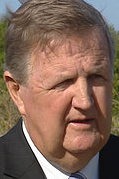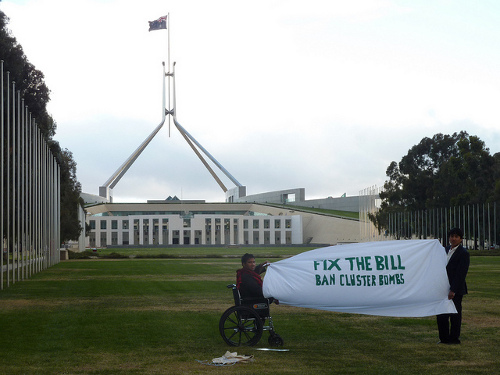Australian Labor Party
On SBS Dateline: Christopher Boyce blows whistle on CIA corruption of Australian democracy, Labor Party & trade union movement
Update, 19 Feb 2014: You can watch the program on-line here. Apologies for this late notice, but after serving his prison sentence of 24 years for spying on the United States Government, Christopher Boyce will reveal all in a program to be broadcast tonight at 9.30 tonight on Dateline on the free-to-air SBS One television station.
Watch on-line at following link: http://www.sbs.com.au/dateline/story/watch/id/601802/n/The-Falcon-Lands
Contendor for Australian Labor Party leadership defends Syria against US-sponsored terrorism
See also: Mark Latham, who opposed "Your Rights at Work" campaign and supported Howard in 2007, says Albanese shouldn't be Labor leader of 9 Oct 2013; Labor Leadership Contenders' Views on East West Link - Albo opposes it! of 6 Oct 2013.
Update, 28 Nov 2013: No mention was made of Syria by Albanese, Shorten or the audience in the leadership debate of 24 September. (Whilst this could have been because of time constraints, it seems a surprising omission.)
On 20 April, 2013, Anthony Albanese, a candidate for the national leadership of the Labor Party by membership ballot,1 expressed 2 his support for Syria3. This is contrary to how much of the senior leadership of the Labor Party has acted. 4 For two and a half years they supported the United States as Syria has tried to defend itself against invasion by proxy terrorists armed, paid for and supplied by the United States. This war has, so far, since March 2011, cost 100,000 lives.
Although Labor is no longer in Government following its defeat at the elections of 7 September 2013, Anthony Albanese's support for Syria is a welcome change to the collusion of senior members of the previous Labor Government with the United States in its war against Libya and the proxy terrorist war Syria. Kevin Rudd, as "roving" Australia Foreign Minister in the Middle East in March 2011, colluded with the United States to help create the international environment that enabled the U.S and its NATO allies to bomb and invade Libya in 2012. Since then, both Kevin Rudd and former Foreign Minister Bob Carr have colluded to help facilitate the terrorist war against Syria by the United States.
The above video is cause to hope that Labor may to return to its past tradition of opposing unjust wars as exemplified by the withdrawal of Australia from the Vietnam War by the newly elected Labor Prime Minister Gough Whitlam in December 1972. Had Labor as a whole so vocally opposed the war against Syria, the level of the political discussion during the election campaign would have been raised and the outcome of the 7 September elections may well have been different.
Footnote[s]
1. ↑ Nominations for the ballot of Labor Party members for the National leadership closed on 20 September, according to an ABC report.
2. ↑ The included Youtube broadcast was embedded in the Crikey article of 2 2013 by Andrew Crook, Support for Syrian missile strike could test Labor unity.
3. ↑ As appears to be mandatory, Anthony Albanese also expressed his support for 'multi-culturalism'. Whilst Syria can rightly be held up as an example of different cultures living in harmony alongside each other for centuries, most notably, between Christians and Muslims, the same cannot be said for Australia, where multiculturalism has been used since the 1970's as a smokescreen to enable governments to impose high immigration.
As a consequence, native Australian workers have had their working conditions reduced or have been replaced altogether. The most infamous example is Section 457 visas by which employers are able to import workers with the supposed skills they claim to need in preference to properly training their own workforce, with on-the-job training or apprenticeships. 'Temporary' backpacker workers are employed in industries such as fruit-picking where that work was once available to low-skilled native workers or university students on summer vacation.
An equivalent process has occurred in the United Kingdom as documented by Tony Gosling in Labour's surrender monkeys dare not criticize Britain's conscript economy of 16 August 2013 in Russia Today.
Another effect of high immigration, welcomed by by landlords and property speculators, is to ensure a scarcity of housing stock, thus driving up the prices that can be demanded of tenants and home-buyers.
4. ↑ how this was dealt with in the Federal Labor Parliamentary Caucus, would be very interesting to know, as much of Bob Carr's most explicit and determined encouragement of U.S. military aggression against Syria followed Anthony Albanese's speech.
Perhaps Bob Carr's sudden resignation from the Senate is not such a mystery given the failure of President Obama, John Kerry, himself, Kevin Rudd and their international allies to win international diplomatic support for their war plans.
Sadly, Kevin Rudd has not resigned from Parliament and it can't be completely ruled out that he will again attempt to contest the national leadership. However, Bob Carr has vanished completely from public view. Nothing more has been posted to his web-site Thoughtlines with Bob Carr since 2 Sep 2013.
Australian Elections 2013: New Dog, Old Clown


It’s been a saga with revolving doors,
First Kevin 07 with all his flaws
Then out as PM in election 2013
But there was another PM in between!

Here’s how it played out: what does it mean?
was it real ?
has it really been?
Kev said he wanted “Big Australia”
Put wool in ceilings and all that paraphernalia
The polls went down,
He wore a frown,
We survived the fallout from the USA property bubble
But it seemed our government was in trouble
To most of us it was as a bolt
The day that Gillard called a “Halt”!
A tap on the shoulder “It’s all over”
A ballot for leader? No. It would be a walkover.
A tight election barely suited
A minority government with help recruited
That's how a woman first came to power,
She had no reason to shrink and cower
But her reign was fraught;
with fashionistas she fought ,
Gillard was not the media’s darling,
Unmarried, atheistic but in reality charming
The press despised her
Were very unkind to her
every slip exposed,
she was goaded, teased
and soapie parodied
Every victory, achievement excluded,
Hard work covered, and buried,
By a press hell bent on virtual asphyxiation.
The deposed PM in retaliation,
treating parliament a bit like recreation
danced and twirled, a constant distraction
bathing in the press reaction
When the media king said “off with her head”
from that point on her leadership was dead,
Rudd who stuck just like molasses
was back to perform for the receptive masses,
The result of this absurd confection
Was for Kev to lead Labor to another election !
BUT Alas for Labor, Kev’s not Rupert’s favorite,
And Abbot’s recipe goes down like chocolate
He’s the new PM, the one we expected,
an ex- priest, a catholic he’s so well connected !
Australian Parliament undermines international cluster bomb eradication laws
The Federal Parliament of Australia, a country which, in the 1960's participated in the devastating war against Vietnam and in the illegal wars against Iraq in 1991 and 2003 and which is now participating in the ongoing war against Afghanistan, yesterday passed legislation to undermine international laws to eradicate cluster bombs. The Governing Labor Party and the Opposition Liberal/National Coalition united to support the bill. This was a betrayal of Australian international obligations, Australian Greens spokesperson Assisting on Defence Senator Scott Ludlam said yesterday after the Government's cluster munitions bill passed the Senate.
This article has been adapted from a media release by Greens Senator Scott Ludlam. See also: Australia poised to pass dubious law to implement cluster bomb ban in stopclustermunitions.org, Australian responsibility: cluster bomb carnage in Iraq of 3 March 2011 by Chris Doran in Online Opinion, Senate considers new cluster bomb laws in the SMH of 20 August 2012, Senate passes ban on cluster munitions (a misleading title) in The Australian of 21 August 2012.
This article has been adapted from a media release by Greens Senator Scott Ludlam.See also: Australia poised to pass dubious law to implement cluster bomb ban in stopclustermunitions.org, Australian responsibility: cluster bomb carnage in Iraq of 3 March 2011 by Chris Doran in Online Opinion, Senate considers new cluster bomb laws in the SMH of 20 August 2012, Senate passes ban on cluster munitions (a misleading title) in The Australian of 21 August 2012.
The Federal Parliament of Australia, a country which, in the 1960's participated in the devastating war against Vietnam and in the illegal wars against Iraq in 1991 and 2003 and which is now participating in the ongoing war against Afghanistan, yesterday passed legislation to undermine international laws to eradicate cluster bombs.
The Governing Labor Party and the Opposition Liberal/National Coalition united to support the bill. This was a betrayal of Australian international obligations, Australian Greens spokesperson Assisting on Defence Senator Scott Ludlam said yesterday after the Government's cluster munitions bill passed the Senate.
Greens spokesperson assisting on Defence Senator Scott Ludlam said the bill "ignores the urgent pleadings of the medical and humanitarian communities and completely fails to meet our obligations under the international Convention outlawing cluster bombs".
"Sub-munitions from cluster bombs that do not explode on impact remain a threat for decades - 98% of the victims of these are civilians. These monstrous weapons have no legitimate role to play under any circumstances.
 Nguyen Thi Cuc
|
 Li Van Thang
|
"This law allows Australian forces to store, transport, and assist in the use of cluster bombs. Harvard Law School's International Human Rights Clinic said this law could 'allow Australian military personnel to load and aim the gun, so long as they did not pull the trigger'. It also fails to outlaw indirect investment in companies producing cluster munitions.
"The Government advised me in the Senate last night that storing and transporting cluster munitions for other countries is not their policy. If it's not their policy, why is it allowed by the legislation? Why not close the loophole?"
Senator Ludlam tabled leaked diplomatic cables - published by WikiLeaks and used in Fairfax media reports in May 2011 - showing the Government, at the behest of the United States, lobbied to undermine the Convention to allow the very same flaws now entrenched in Australian domestic law.
"Despite the denials, leaks revealed that the Government lobbied countries to water-down the Convention on eradicating cluster munitions. That shameful misadventure failed, and as a result our country is a signatory to an unequivocal agreement aimed at eliminating cluster munitions from the face of the Earth: There is no grey area and there are no excuses - yet tonight the Government and the Opposition have shown no backbone and no honour."
Media Contact: Giovanni Torre - 0417 174 302
Can only the corrupt rise to the top in politics?
In spite of much having been done by Prime Minister Julia Gillard that we should be rightly critical of, I still hold hope that there may be an outside chance that a person who has risen to the political top in her country, may have greatness and a streak of decency in her. Knowledge of past history, particularly that of the United States shows that a corrupt elite don't, on every occasion, succeed in corrupting those who rise to the top of their country's political system. This article was originally a comment.. 
In spite of much having been done by Prime Minister Julia Gillard that we should be rightly critical of, I still hold hope that there may be an outside chance that Julia Gillard, who has risen to the political top in her country, may have greatness and a streak of decency in her.
What gives me this hope is the courage she showed in toppling her indescribably bad predecessor, Prime Minister Kevin Rudd, instead of remaining meekly subordinate to him as nearly every other Labor politician in recent decades, would have done. What also gives me hope is knowledge of the history of the United States of America. In the 18th, 19th and 20th centuries, people of indisputable greatness and good will, who showed that they were determined to challenge, rather than make compromises with, the corrupt vested interests in the USA, made it to the highest office in the land (or almost certainly would have if they had lived). These figures include, in the 20th century, Presidents John F Kennedy, his brother Robert, President Roosevelt and Martin Luther King. In the 19th century, they include President Lincoln, who waged the Civil War to abolish slavery and challenged the power of private banks, and in the 18th century, they include Presidents, Washington and Jefferson and many of the other founding fathers of the United States.
Of course, it is far more likely that anyone who makes it to the top of a political system in a society under the domination of a corrupt elite will either have been corrupt at the outset or will have been corrupted in the process.
The above examples show that there can be exceptions to that rule.
President John F Kennedy tried to end his country's military intervention in Vietnam (and would have, had he lived) and stopped the military industrial complex from invading Cuba and waging nuclear war. Domestically he stood up to the banks and the steel companies.
President Roosevelt stated in 1944 that he intended to introduce a second part the the US Declaration of Human Rights that would have guaranteed every American citizen the right to paid remuneration that would have met his/her needs for sustenance and shelter. If he had not died in 1945, America could not have become the extremely unjust society that it has since become, as shown in Michael Moore's film of 2009 "Capitalism: A Love Story".
Humanity's unacknowledged debt to Robert Bowman
Another, so far, largely unsung hero (and, astonishingly, unsung by even the supposedly anti-war and anti-racist 'left') is Vietnam War veteran Lieutenant Colonel Robert Bowman. He used his influence to stop Ronald Reagan from launching global nuclear war in the 1980's with his Pershing and Cruise missiles and Star Wars program. He made roughly 5,000 public speeches (I think that is the count) against Reagan's plans for war and in doing so, probably made the greatest individual contribution towards stopping him. For this reason alone the debt humanity owes Bob Bowman may even be greater than that owed to the late President Kennedy.
Robert Bowman has also told the world the truth about the US wars against Iraq in 1992 and 2003 and the supposed attack on the US by Islamist extremists on 11 September 2001.
In Kennedy's case, critics can point to actions of his which seem to have been unprincipled, as we can with Julia Gillard. A number of these actions can however be shown to have been necessary compromises to make possible the eventual achievement of far greater good. If, in spite of human fallibility and the corrupting influence of most other politicians and the political system, such wonderful people were able to use their positions of power to achieve the great good that they have, we should not completely exclude the possibility that decent people can also rise to the top in Australia.
(I apologise that I can't give examples from Australia that are as concrete. I don't know enough to be able to say if certain famous past Australian leaders were as great (considering their more limited context) and as well-intentioned as those in the USA mentioned above.)
Title of article was originally "All who rise to the top of politics aren't necessarily corrupted ".
ABC gives free kick to Iemma, NSW electricity privatisation
 When Barrie Unsworth complained on Sydney's local ABC radio of the New South Wales Labor Party's efforts to ensure that state Labor parliamentarians vote against the privatisation of NSW's electricity assets - a policy already rejected resoundingly by the electorate in 1999 and currently opposed by 79% of the NSW public - his interviewer Toni Matthews expresssed her total agreement with the former NSW Premier: "Why - It seems obvious to me - Why isn't it obvious to these younger members that you're talking about that they're creating mayhem within the party?"
When Barrie Unsworth complained on Sydney's local ABC radio of the New South Wales Labor Party's efforts to ensure that state Labor parliamentarians vote against the privatisation of NSW's electricity assets - a policy already rejected resoundingly by the electorate in 1999 and currently opposed by 79% of the NSW public - his interviewer Toni Matthews expresssed her total agreement with the former NSW Premier: "Why - It seems obvious to me - Why isn't it obvious to these younger members that you're talking about that they're creating mayhem within the party?"
On 15 July, Sydney's local Radio Station gave a free kick to the NSW government's efforts to hand privatise the electricity assets of NSW when fomer NSW Premier Barry Unsworth was interviewed on the Morning Show by a wholly sympathetic and uncritical Toni Matthews This was subsequently reported in other media including the West Australian and ABC's online news service. In the interview Barrie Unsworth spelt out his plans to again enlist Labor 'elder statesmen' to including former Prime Minister Paul Keating, former Labor Premier Bob Carr and former Labor Council heads Michael Easson and John MacBean, to wear down the resistance of the NSW Labor Party to the privatisation of NSW's electricity assets. The online ABC report was misleadingly entitled "Keating, Carr asked to heal NSW Labor".
The ABC reported:
Mr Unsworth has lashed out at NSW Labor state secretary Karl Bitar for actively campaigning against Mr Iemma and his power privatisation plans, which the former premier supports.
 However, if Mr. Unsworth had been a little more consistent, he would have also 'lashed out' at the entire NSW Labor Party, which, at its conference voted 702 to 107 against privatisation and he would have 'lashed out' at the NSW union movement.
However, if Mr. Unsworth had been a little more consistent, he would have also 'lashed out' at the entire NSW Labor Party, which, at its conference voted 702 to 107 against privatisation and he would have 'lashed out' at the NSW union movement.
If Mr Unsworth had been consistent, he would have, above all, 'lashed out' at the NSW public, who have failed to budge from their emphatic opposition to privatisation. On 29 June it was reported that an opinion poll found 79% opposed to privatisation, even when the Government's rationale for privatisation was put to them1. This poll is consistent with an earlier poll sponsored by the NSW union movement which found that 85% of the NSW public opposed privatisation.
It would therefore seem odd for Mr. Unsworth to have felt only resentful towards only a few Labor Party and trade union officials. Why Toni Matthews failed to point out these widely understood facts is unclear.
It is striking that Toni Matthews made no effort to challenge the seemingly very weak case put by Mr Unsworth for privatisation:
... I think it's an argument that has gone beyond its time because everywhere else in Australia electricity is conducted on the basis of a national market and there are some people - you would virtually call them Luddites in this state who can't comprehend that or don't want to accept that times change. I was saying to someone yesterday: Where's the state dock yard? Where's the state abattoirs? Where's the state brick works? I mean those sort of things come from another era and, quite frankly, governments should get on with the jobs that they're entrusted to do and get out of activity which is no longer relevant.
So, it would seem that 79% of the NSW public are 'Luddites' because, unlike Barrie Unsworth, they do believe that the provision of electricity, if not, perhaps, bricks, abattoirs and dockyards, are core government business.
In much of the interview Unsworth vented his indignation at the efforts made, within the NSW Labor Party, to remove the abysmally unpopular Premier Morris Iemma as leader of the NSW Parliamentary Labor Party. He told ABC 702 Sydney Local Radio:
"All this talk about forcing the Premier to leave office and searching for some other candidate is not in the best interest of the Labor Party,"
"I'm just appalled that there are people in trade union leadership and also now in party leadership positions who are seeking to achieve that end."
Toni Matthews, not for the first time and not for the last time in the interview, expressed her total agreement with the former Premier when she responded, "Why - It seems obvious to me - Why isn't it obvious to these younger members that you're talking about that they're creating mayhem within the party?"
Barrie Unsworth was particularly indignant at the attempts by the NSW Labor Party to ensure that Labor parliamentarians support, on the floor of Parliament, Labor's opposition to privatisation. He complained, "I have been able to confirm that parliamentary members in marginal seats have been brought to head office and in effect told that their preselections would be at risk if they didn't support the directives of head office".
"This is a democracy," Unsworth continued, "The people of NSW elected the Government, not people down in Sussex Street."
The full transcript interview lasting 8 minutes is included below. It is an illustration of how poorly the people of Australia continue to be served by its newsmedia, even the supposedly independent and 'left wing' ABC.
Unsworth's inititative, should it succeed in getting the NSW Labor Party to acquiesce before Iemma and Costa, will no more 'heal' the NSW Labor Party than did acceptance of the privatisation program of the Hawke and Keating governments 'heal' the national Labor Party back in the 1990's.
The privatisation of Qantas and the Commonwealth Banks, also carried out against Labor's own platform and also without any mandate from the electorate, only helped pave the way for 11 dark years of even worse misrule by the Howard Government. The privatisation of the remaining Government-owned half of the Commonwealth Bank followed Paul Keating's election victory in 1993. It was privatised despite a specific promise made by Keating not to. This only served to help demoralise Labor's own ranks and handed a perfect propaganda weapon to the Howard opposition, which had cynically voted in Parliament to support the breaking of Keating's 1993 election pledge2. From then, amongst the repertoire of responses to any objection to the Coalition's own plans to privatise Telstra, was to remind the electorate that the preceding Labor government had "privatised everything that moved."
It became impossible, during subsequent federal elections campaigns, to convince many rural residents, hard hit by the Commonwealth Bank privatisation and Labor's overall neglect of rural Australia, that Labor was sincere in its stated opposition to Telstra privatisation, which, in any case, it has retrospectively endorsed.
In the inteview Unsworth accused the younger Labor Party officials of failing to understand history: "I mean if they had looked back over history, they would realise that disunity is death."
In fact it is Unsworth, himself, who seems unable to grasp the lessons of Labor's history. Whilst 'unity' under the pro-big-business leadership of Hawke and Keating, did not save Labor supporters and the broader Austrlian public from the catastrophe of the Howard years, open defiance of the NSW Labor Party of Premier Carr's earlier attempt to privatise electricity did not cost it office. In 1999, when Labor stood against a Liberal/National opposition pledged to fully privatise electricity, it won resoundingly, in spite of being led by Bob Carr. This is clear evidence that the NSW public can be discerning enough not to automatically turn away the Labor Party simply because of an episodic display 'disunity'.
NSW Labor's best chance to both hold on to office and to actually do something whilst in office, other than serve the interests of the corporate sector and property developers, would be for the ranks of the Labor to disendorse all of their parliamentiary supposed 'representatives', who have turned their backs not only on them, but also on the NSW public and basic principles of democracy, starting with Iemma and Costa
Footnotes
1. ↑ John Kaye calls on Iemma to dump sell-off as NSW public repudiate privatisation of 29 Jun 08 by John Kaye
2. ↑ To their credit, the NSW state Liberal/National Party Opposition has acted in a far more principled and decent fashion than did the Federal Liberal/National Opposition in the 1990's, not to mention the NSW state 'Labor' caucus. Paradoxically, it is thanks to the them, far more than to the Labor caucus, only a small handful of which were prepared to support Labor's own policy on the floor of the NSW Parliament, that the attempt to flog off NSW's electricty assets has been defeated thus far. This is in spite of such a stance threatening to strain their relationship with the NSW corporate sector as The Australian newspaper ominously warned in June. Had the Liberals and Nationals not inisted upon the privatisation legislation be referred to the NSW Auditor General, the legislation would almost certainly now be law.
See also: Unsworth report is a dead duck of 11 Mar 08 by Ed Lewis, John Kaye calls on Iemma to dump sell-off as NSW public repudiate privatisation of 29 Jun 08 by John Kaye, No Mandate, No Sale - Demand Costa and Iemma debate electricity sale in Parliament of 14 May 08 by John Kaye
Appendix: Full transcript of Interview of Former NSW Premier Barrie Unsworth by Toni Matthews
The follwing has been transcribed from MP3 file linked to from "Keating, Carr asked to heal NSW Labor"
BU:We've got an unprecedented situation at the moment where the leadership of Centre Unity (the predominant right wing faction in the NSW Labor Party) is undermining the Government of the state of NSW in the Premiership of Morris Iemma. Now, that's just untenable. I attended the party conference in May and the scenes that occured there I have never seen in my more than 50 years' membership of the party.
TM: Well, what do you mean? What kind of scenes are you talking about?
BU: Moving censures on the Premier and the party secretary giving leadership to the Centre Unity faction by actively campaigning and speaking against Premier Iemma. Now, Premier Iemma won the New South Wales elections last year, brought the Labor Party back into Office, continued the Labor Government that was commenced by Bob Carr back in mid-nineties and he should be rewarded for that - not attacked by the party administration as occurred at the conference.
TM: Well, it does seem a little unusual ...
BU: ... and as has occurred since then.
TM: ... mmm, and seems very destabilising.
BU: Well, I have been able to confirm that Parliamentary members in marginal seats have been brought to head office and, in effect, told that their preselections would be at risk if they didn't support support the directives of head office. Now, this is a democracy. The people of New South Wales elected the Government, not people down in Sussex Street (the head office of the NSW branch of the Labor Party). Now, I have been one of those apparatchiks. I know how the system works, and what I say is the elder statesmen of the Party should come together, have a look at what's happened to the party in this last 30 years - look at where it is at the moment - controlled by a group of younger, and in my view, inexperienced members, and look at the real issue. The real issue is keeping Labor in Government. The real issue is supporting a premier who won an election a little over twelve months ago, and will be in office for almost another three years, and all this talk about forcing the Premier to leave office and and searching for another candidate is not in the best interests of the Labor Party and I am just apalled that there are people in trade union leadership and also now in party leadership positions who are seeking to achieve that end.
TM: Forgive me, Mr Unsworth. Why - It seems obvious to me - Why isn't it obvious to these younger members that you're talking about that they're creating mayhem within the party?
BU: They haven't had the experience. I mean I have been reading some of their profiles on the weekend. They've been in the Labor Party for less than ten years and some of them are holding senior positions. I mean if they had looked back over history, they would realise that disunity is death, and if you destabilise the party you will be out of office and it's a lot harder to get back into office than it is to get out of office and I should know. Oppositions - they don't win elections. Governments lose them and having lost an election in '88, I can see the same situation occurring again in 2011 unless the party settles down, so it needs people who have had the experience, who were at the formation of Centre Unity such as those that I have nominated and I have nominated and spoken to John McBean who was party President and Michael Costa, who was secretary of the Labor Council, and both John and I were secretaries of the Labor Council. I know Paul Keating, because of the letter he wrote to the papers after the conference, is of a like mind and I have spoken to Bob Carr about the situation and I think that we've got to come together and give some direction.
I've spoken to delegates who were at the conference who were most uncomfortable with the direction they were given by the leadership of the Centre Unity at that conference. Some of them walked out and didn't vote and others voted, because they were under pressure, within their delegations and the leadership they were given was abysmal.
TM: It's twenty to nine on Mornings on 702. I am talking with former New South Wales Premier Barrie Unsworth about the current disquiet within the state ALP. Mr Unsworth, is this factional warfare playing into the hands of the Opposition?
BU: Obviously, it is! Obviously, it is! I made the point to the Premier, I think his popularity is at 28% - something like that, and I was editorialised once as "Mr twenty six percent", but I was able to claw back to 62%.
TM: That's just the media, isn't it?
BU: Well, I think ...
TM: (laughs)
BU:I think the media conducts the polling, and I've been in radio. I know a little bit about polling. Popularity comes and goes and it depends upon how you're treated by teh communication mediums and I think Premier Iemma has - he's got some very good policies. He's put in to action quite a number of them in the interests of the community in key areas such as health and transport and public security and this whole argument is just about electricity and I think it's an argument that has gone beyond its time because everywhere else in Australia electricity is conducted on the basis of a national market and there are some people - you would virtually call them Luddites in this state who can't comprehend that or don't want to accepet that times change. I was saying to someone yesterday: Where's the state dock yard? Where's the state abbottoirs? Where's the state brickworks? I mean those sort of things come from another era and, quite frankly, governments should get on with the jobs that they're entrusted to do and get out of activity which is no longer relevant.
TM: I gather that you have spoken to the Premier recently. How is he feeling about all this? He must be disappointed.
BU: I think that Premier Iemma shows great resilience and his public persona, I think, is tremedous because he's prepared to get on with the job and - sort of - brush off these frustrations, but i think we have got to send a message to the people who are white-anting the party that it's just not acceptable. It's not not just in the interest of the party, but all of the - you know - the millions of people in New South Wales that support the Labor Party that put them in office last year and expect them to do a job in the intersts of the people of this state.
TM: Mr. Unsworth, what would you say to those people who say, "Look, you've been around the block. You've had your time. It's now for the younger people, coming up through the ranks. If they make mistakes, so be it. Let them make mistakes. Let them learn.
BU: Well, you can't learn on the job. I mean, they should become a little more proficient. A lot of people that are in these positions today have never really worked. The system has changed. You have got a lot of staffers that get into these positions who have never had a job in industry. I mean, I - I am an electrician. I have worked as an electrician. I have come up through the ranks, and many of the people - and all of my contemporaries had that experience. You've got young inexperienced people now in positions of authority, and it's not just a question about "We've had our time". We've got the experience. We've got the runs on the board. We've been through all of these situations, the splits in the Labor Party, and we don't like it. And what we want to see is a bit of a steady-up. What it's all about is the egos of one or two individuals in the trade union movment and the ambitions of others in the party machine, who, themselves, want to see that they exercise parliamentary representative office.
TM: So, Mr Unsworth, if this factional issue isn't addressed before the next election, it's certainly going to have an effect on the results.
BU: Oh, huh. The next election's not for another three years. It'll be addressed well before then and I think it will have to be addressed again in the immediate future, because the Government has got to get on with the job, not be distracted by all this self-indulgent behaviour of a handful of people.
Victorian treasurer mentions population growth
from The Age, 28th April 2008
link to article from The Age
The last 3 sentences are of interest:
Mr Lenders, who grew up on a Gippsland dairy farm and was briefly a Young Liberal, said there should be a debate on how Victoria handles population growth.
But it was the Government's role to help make Melbourne liveable, not to determine how big it grew.
"I'm not quite sure what governments do about that," he said. "If we are trying to have a vibrant economy, people will want to come and live here."
First sentence above is not controversial, but at least a debate could give an airing to the issues that are impacted by population growth.
The second sentence shows how governments in this country "govern", by excluding themselves from issues that governments should deal with. Lenders is using the TINA (there is no alternative) argument, he probably means that because the ALP is funded by the growth lobby we should allow the lobbyists to set policy and the governments role is purely one of management.
In the last sentence he purposely confuses the reasoning behind the current rate of immigration, there is no question that Australia is an attractive destination, it is the role of governments (state and federal) to govern for all Australians and set about creating and implementing policies to that aim, instead of allowing those who are able to give big donations to political parties and have a large lobbying infrastructure to do it for them.

Treasurer John Lenders: "I think a state of excitement in treasury can imply that you are not doing your job."
Full article:
Mr Excitement? Not me, says state money manager
Treasurer John Lenders: "I think a state of excitement in treasury can imply that you are not doing your job."
Photo: Roger Cummins
Melissa Fyfe
April 27, 2008
JOHN Lenders wants you to know he is not an exciting kind of guy. In fact, the state Treasurer admits people may think he is dull and, yes, he loves spreadsheets.
Mr Lenders, who will step out of the shadow of Premier John Brumby, Australia's longest-serving state treasurer, to deliver his first budget on May 6, also wants you to know that his non-excitable pair of hands is a safe place for the state's finances.
"If the accusation against a treasurer is that they he is a dull person but has an addiction to spreadsheets, it is probably a very good addiction for a treasurer to have," said Mr Lenders, in response to a comment once quoted from an unnamed critic.
"I think a state of excitement in treasury can imply that you are not doing your job, which is to prudently manage resources."
In an interview with The Sunday Age, the career politician and former state Labor Party secretary saidgovernment revenue would be about $37 billion, up from $34.3 billion last year.
He said Victoria's economy was still growing strongly despite global financial problems. The drought recovery forecast in last year's budget, however, had turned out to be "patchy".
Mr Lenders, who had held the portfolios of finance, education, industrial relations, WorkCover and major projects, said there would be no money in this budget for the Eddington transport plan, as it was still up for public discussion, and the Government had not formed a response.
He said there would be no extra money — beyond an already committed $150 million — for the construction phase of the channel deepening project.
He would not be drawn on relief for home buyers in the forms of cuts to stamp duty, or the business wish list of tax cuts, such as land, payroll and WorkCover.
Mr Brumby decided to give the Treasury job to Mr Lenders over a younger colleague, Tim Holding, partly on the grounds that Mr Lenders is a family man. As such, Mr Lenders said, he was guided by thinking about opportunities for his three adult children.
Mr Lenders, who grew up on a Gippsland dairy farm and was briefly a Young Liberal, said there should be a debate on how Victoria handles population growth.
But it was the Government's role to help make Melbourne liveable, not to determine how big it grew.
"I'm not quite sure what governments do about that," he said. "If we are trying to have a vibrant economy, people will want to come and live here."
What are the prospects for Labor bringing about a just society?
The Australian Labor Party, the world's oldest political political party still in existence, is a contradictory organisation. With its record in Government, at the Federal and state levels, and in opposition, led by Kevin Rudd, with an ever-diminishing number of policy positions which distinguish it from the ruling Howard Liberal Government, it is all too easy for critics to the left of Labor to dismiss it as no better than the Liberal Party as indeed the Greens, the Democrats and some parties of the far left have maintained either implicitly or explicitly.
Yet there seems to be no other path out of the political rut in which this country has become stuck since the election of Howard in 1996, except through the election of Labor.
Labor's dismal record since 1983
Since at least the early 1980's the Labor Party has been dominated by leaders who have acted to represent the same kinds of powerful vested interests that the Labor Party was originally formed to oppose, that is large corporations, financiers, property developers and land speculators.
Every Labor Government that has come to office since 1983, at both the Federal and state level has shamelessly, and often corruptly, served those interests to the detriment of its own support base, the country as a whole, and the environment.
Both Bob Hawke and Paul Keating willingly adopted the agenda of the economic neoliberals to 'reform' the Australian economy to give more wealth and power back to the Australian elite. This entailed the deregulation of the Australian economy, including the rate of exchange of the Australian dollar and the banking and finance sector, allowing greater access by foreign investors to Australian companies, land and mineral wealth, and an increase in the rate of immigration.
In 1986, the Hawke Government privatised the pension system, adopting the model of that had been conceived by neoliberal economist Milton Friedman and had been previously implemented by the Chilean military dictatorship. They failed to even consider the more equitable and efficient system which had been proposed by Professor Keith Hancock for the previous Whitlam Government.
The result has been that millions of ordinary Australians, in an increasingly casualised labour market, often having been forced to join a new scheme for each new employer, have had much of their funds flow, as commissions and annual management fees, into the pockets of the fund managers. In spite of this abysmal outcome, the Labor Party still, almost unbelievably, hold this to be a proud achievement of the Hawke/Keating years.
Almost following to the letter John Howard's script presented to the public in the 1986 elections, the Hawke and Keating Labor Governments sold nine of the twelve public enterprises on John Howard's hit list, including the Commonwealth Bank, QANTAS, and the Commonwealth Serum Laboratories. They stopped short of privatising Telstra, but they nevertheless deregulated the telecommunications sector, paving the way for the Howard Government's eventual full privatisation of Telstra.
At the state level, Labor Governments have been no better. They, too, have sold off state owned banks and insurance companies and much publicly owned land and many publicly owned buildings. Most have harmed the environment by promoting population growth and property development and supporting ecologically destructive industries including woodchipping, coal and Uranium mining and aluminium smelting.
Even at the level of local government where they should be closer to the people, Labor councillors still poorly represent many communities. Brisbane City Council, whilst having a Liberal Lord Mayor Campbell Newman elected in 2004 still has a majority of Labor Councillors. However, Brisbane residents' hopes that Labor would use its majority to curb the excesses of Newman have been repeatedly dashed.
Today, much of Brisbane resembles a war-zone as Campbell Newman realises his engineer's dream of fixing up problems, caused by population growth and past planning failures, by building a parallel transport system underneath Brisbane. Tunnel projects include the North South Bypass Tunnel (NSBT), the Northern Link and the the Airport Link. All of these are to be operated by private consortiums and their use will incur tolls. In addition, all bus movements through the CBD are to be moved underground, to leave the streets above ground free for private motor vehicles.
Most of these projects have provoked heated community opposition and groups have been formed to oppose the NSBT and the Hale Street Bridge. In spite of the overwhleming cases against all of these projects and ovewhelming oppostion from at least the affected communities, the Labor majority has given into Mayor Lord Mayor Newman on each occasion.
Why Labor can nevertheless become a vehicle for change
However, the fact remains that the Labor has drawn, and continues to draw, into its ranks, people who have the best motivations and aim to work through the Labor Party to bring about goals similar to what the Labor Party originally stood for. It would be wrong to assume, in spite of the seemingly insurmountable corrupting influences that now exist within Labor, that such elements will never again prevail.
This happened in the years of the Whitlam Labor Government and happened, more recently, albeit very briefly and tenuously, when Mark Latham became Labor Party leader.
Mark Latham's diaries published in 2005, reveal that he had, indeed, joined the Labor Party, entered Parliament and worked his way up the ranks all the way to the Federal Labor Party leadership for the most laudable aims.
To be sure, many of Latham's political ideas, including his embrace of 'dry economics' were not good. He held out Tony Blair's Labor Government in the UK, which had left intact nearly all of Margaret Thatcher's program of privatisation, emasculation of the Trade Unions and cutbacks to social spending and which had followed George Bush into the Iraq war, as the model that an Australian Labor Government should follow.
Nevertheless, in spite of this, it is clear that Latham was genuinely offended by the corrupt power of Australia's elites as well as those within the trade union movement and the Labor Party and was resolved to end this. In his diaries, he stated that his goal was to take political power in order to give it back to communities and ordinary people. He also adopted 'politically incorrect' stances including opposition to high immigration and once referred to many Australians' fixation upon the rising value of their own homes (largely caused by the increased demand for property fueled by immigration) as 'the great Australian disease'.
He was resolved to begin to drastically reduce the scale of woodchipping in Tasmania and to end Australia's involvement in the Iraq war.
Having stood for such decent democratic principles also eventually proved to be Mark Latham's undoing, but the fact that he came so close to succeeding, shows that even the Labor Party is not entirely impervious to the influence of genuinely uncorrupted progressive political forces.
If the Labor Party, with a leader demonstrating the elements of idealism and altruism shown by Whitlam and Latham were ever to form Government, then that Labor Government could indeed be the vehicle for the changes which are necessary to establish a fair and decent society and also to confront the grave environmental threats that our society and our whole planet face.
Even given the questionable record of the existing Rudd-Gillard Federal Labor leadership, it can't be entirely ruled that either or both of them may yet prove to be such leaders.
However, this seems unlikely in the current political context. If Labor is elected the two more likely scenarios are:
- a monolithic Labor Government which will govern in the interests of the wealthy as those of Keating and Hawke have done before, or
- a less monolithic Labor Government, where those opposed to pro-business policies will be prepared to take a public stance.
An anti-Howard grass roots mass movement is needed
A non-monolithic Labor Government is more likely if a popular grass-roots movement in favour of progressive change is brought into existence.
Such a mass movement should be unambiguously in favour of the election of Federal Labor as the only feasible alternative to the continued rule of John Howard's unaccountable, anti-democratic and morally bankrupt Government.
This should not preclude it from from being strongly and openly critical of Labor's poor policy decisions: support for woodchipping and the pulp mill in Tasmania, support for Uranium mining, watering down of its opposition to 'WorkChoices', support for high immigration and population growth and the abandonment of opposition to privatisation of Telstra.
Also, this should not preclude such a movement advocating a primary vote for independents or smaller parties which have better policies than those of either Labor or Liberal.
However, it must be unflinchingly clear on the need to use Australia's preferential voting system to preference Labor candidates ahead of any Liberal or National candidates. This will ensure that where those minor candidates or independents fail to win office their votes will flow to a Labor candidate.
If it argues such a case clearly and logically it need not drive voters back into the arms of the Liberal Party.
If, upon winning Government, Federal Labor maintains its current pro-business agenda, then the grass-roots movement will be in a position to ensure that disaffection with the Government will cause Labor's base of support to change its allegiance to something better, rather than to simply drift back to the Liberal Party as has happened in the past. In such circumstances, the prospect of a party such as the Greens, or else, some other party formed through the likely ensuing political struggles being able to form Government, will become more achievable.
However, this scenario is unlikely to unfold if John Howard's Government retains office in 2007.
Footnotes
1. "Australia's neoliberal path" by Kenneth Davidson in Dissent Magazine isue 23 Autumn?Winter 2007.







Recent comments